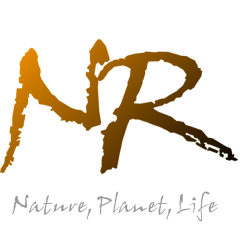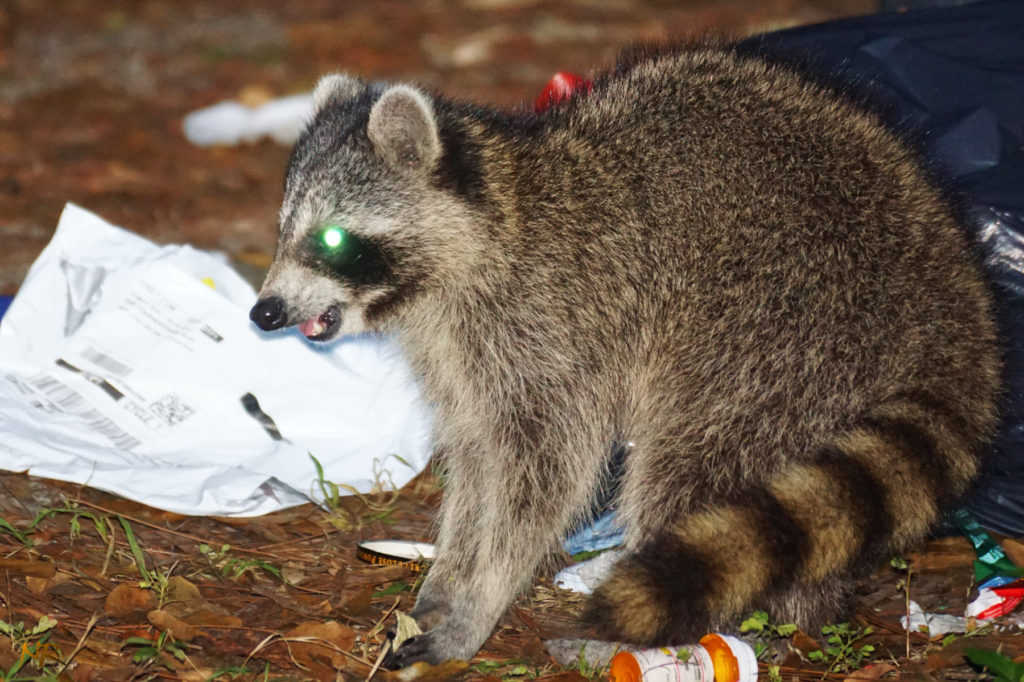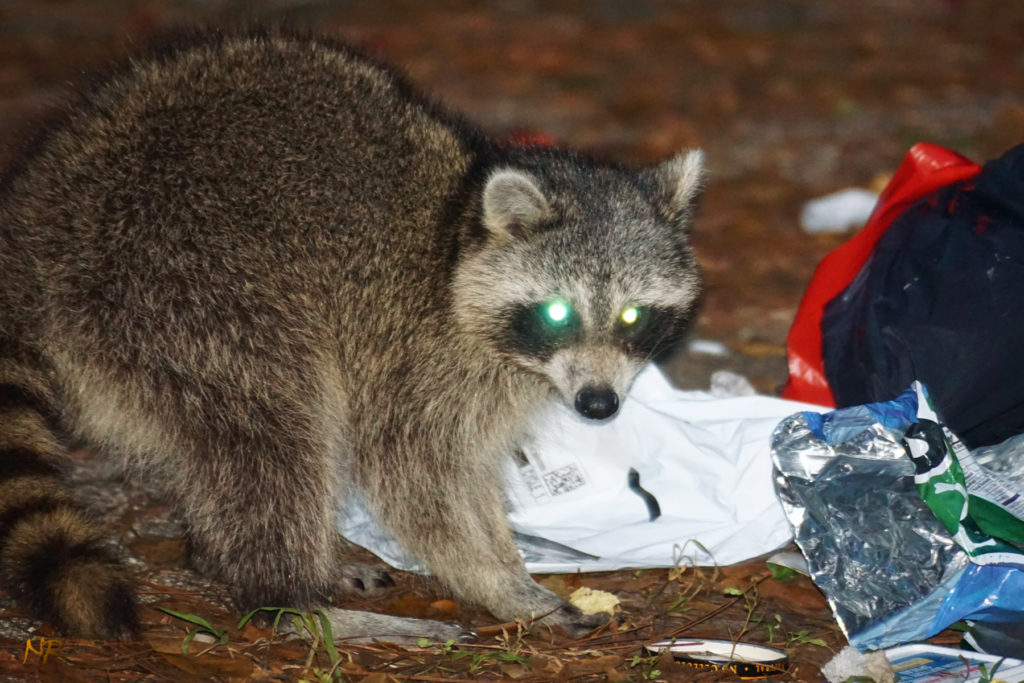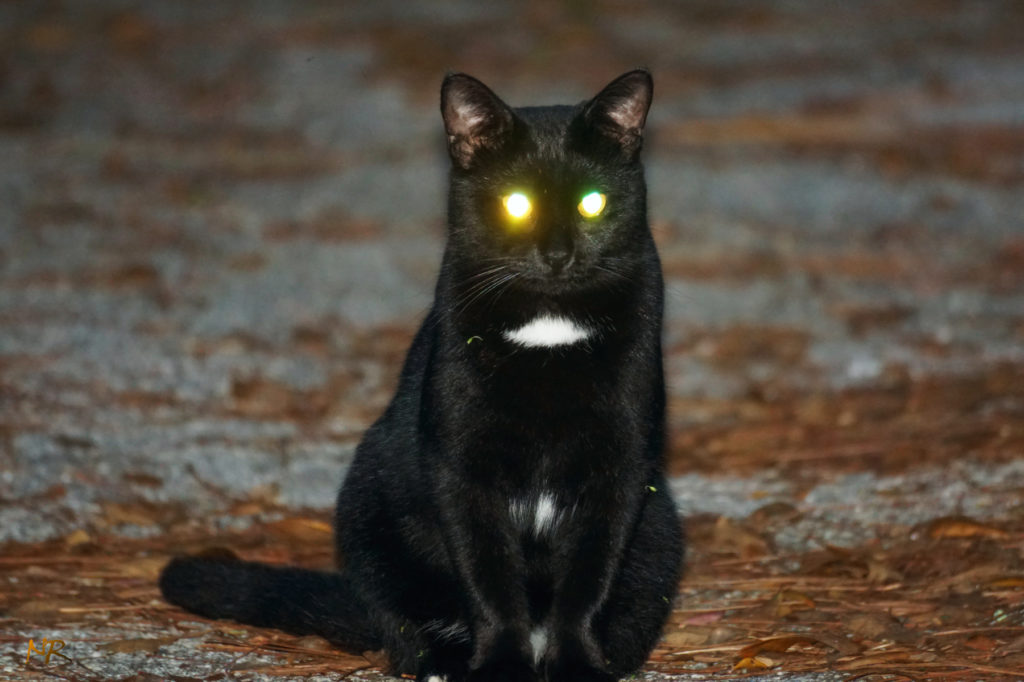So yesterday morning while still dark, I caught red-handed this mischievous raccoon tearing through a bag of garbage that I had left beside the trash can.
Note to self … don’t generate more trash than your trash can can hold!
Me being me, instead of worrying about the state of the mess, I grabbed my camera and tried to get some shots of his adventure. I had to resort to flash because it was still almost pitch dark, so I knew that nothing stellar was going to come of this “shoot”.
I also noticed that the beautiful stray cat who has been coming around this past couple of weeks was supervising the whole scene, which in my books makes him partly responsible!
When I got back in and looked at the images, I found these three which I think are shareworthy for one particular reason.
I know we have all seen this a number of times … eyes glowing in the dark when a light hits them. In humans we get simple red-eye which can be a destroyer of images (and yes, I know about red eye reduction) but in animals, I noticed that different animals’ eyes glow different colors and almost none of them red.
In fact, even within animal groups their eyes will glow differently. For example, several times I have gone out looking for Coco in the dark. He’s my little cat buddy and his eyes glow orange in the dark, while others glow green.
Being a black cat in the dark, it is my only way of identifying him among other intruders.
So, the first thing I did was to set out to find out why. Interestingly the answer also helped provide an answer to a question that I had been wrestling with earlier in the week, which is why some animals can see so much better than us in the dark.
Anyway, to get to the first point quickly … nocturnal animals have a layer of membrane behind their retina (called “Tapetum Lucidum” for those who wish to know) that reflects light back into the retina, thereby giving the retina almost twice as many photons to see than us. We don’t have such a membrane. I had innocently thought that it was something to do with how wide a pupil gets … see that’s the engineer in me, rather than the biologist.
Depending on how much zinc is in that membrane, the end color flashes back differently from one creature to another. You were wondering how the title of today’s post was going to work into this discussion, weren’t you?
Zinc is a huge part of the dietary requirement for many of this planet’s creatures and meat is a huge source of it. Nuts, seeds, and other foods are also good sources. And lo and behold, it has a real bearing on vision. Who knew!
But beyond this enlightening information, the real thought that occurred to me was every time I think I know something about this natural planet we live on, I realize how little I know.
The diversity of our co-inhabitants is not just stunning on a topical level, to where we see physical shapes and sizes, attributes and behaviors. But internally on the systems that drive us and allow us to live.
As humans, we think we know all and ravage the environment for our own purposes. We over-inhabit, over-develop, pollute and destroy. And we bully sixteen year old girls that ask to to stop.
We are the epitome of the bull in the china shop, destroying ecosystems at every turn. Systems we don’t even understand. And worse still, systems we don’t care about.
I like to think that I know something about the planet and the environment. But in my brightest moment, I doubt if my knowledge even approaches the 1% mark of what we really should know.
But we elect leaders that know far less and empower them to do far more damage than I could ever do in my lifetime.
The shame of all of this is the apathy of the majority of humans. Because it isn’t so much that they don’t know. It’s that they don’t want to know and that they don’t care.
We’ve written volumes on human achievement and evolution. We’ve claimed supremacy over all creatures and created a god that is apparently in our image. In making such pathetic and unfounded claims, it affords us the right to do what we want and disregard other creatures as collateral damage.
Our supremacy over all creatures is no more than the supremacy of a host of locusts that devours everything in its path. The feeling of supremacy may be momentary, but the devastation left behind can last eons.
So, what is the point of my rambling words?
Very simple. Individually we need to make ourselves more aware of our planet. Learning about it is much more important than learning the latest App. And collectively we need to make sure that if we are going to put dotards in control of things, let’s at least put simpletons there who are planet-aware.




